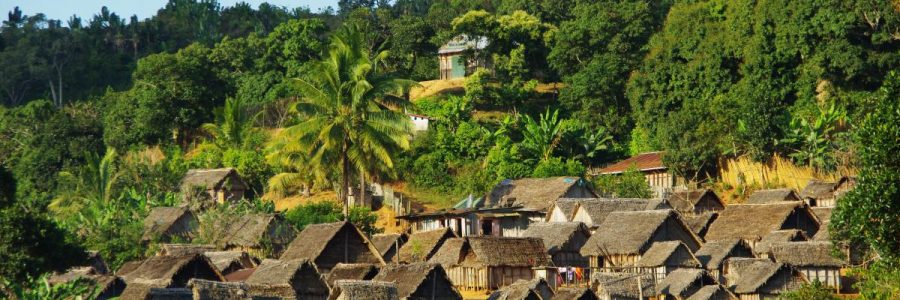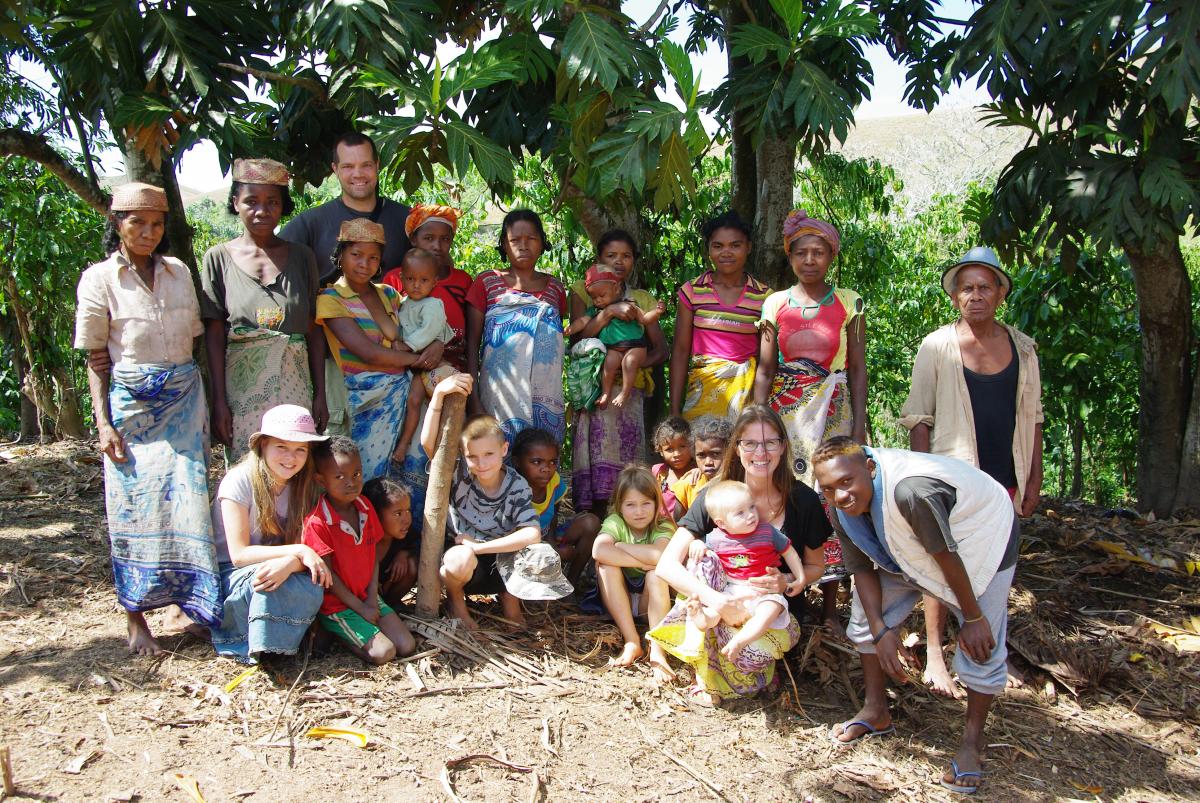30 May 2017
Several months have past since we moved to the place of our ministry: Maroamboka. We are blessed with a nice house and enough space for the children to play and to be schooled and to withdraw from daily busyness as a family.
The house is constructed mainly with wood from the nearby forests. We have a tin roof and the downstairs floor is made of concrete. We had already bought a solar-panelsystem in Tana so we even have lights during the evenings and electricity to recharge our phones and laptops. We also have a 500 litre water reservoir next to the house. This sounds like a lot but it will surprise you how much water a family of seven needs during the day. Officially we would have running water in the house. The builders connected water-pipes to the pump only 10 metres from the house. Officially? Yes, we know, that needs some explanation.
It was in the middle of the rainy season when we moved here… Only, there was no rain yet. Our water reservoir was empty and the pump was not working. We had to walk, with our jerrycans, to the nearest pump in the village only to discover that all but one stopped working. The only working pump was at the same time the one that was furthest away and not giving water on a regular base. If it gave water it was really slowww. As a consequence Jurgen had to put al the jerrycans in the car and drive to get water elsewhere. Easier said then done. To get to good water he had to drive about 5 kilometres, walk through several rice fields and climb high rocks. There he could get water from a spring. Needless to say that walking and climbing with a 20 litre jerrycan is tiresome and dangerous. Doing this will quickly help you to discover how much water you use during a day.
It was no fun for Katja and the children that Jurgen had to go to Tana for a week to get the car papers. Everybody was under strict rules concerning the use of water. Katja asked a local boy to fetch water. She payed him the same wage as water-fetchers in Tana receive. This money is a good salary in this region. The boy was motivated at first but soon he lost his motivation and he simple did not come anymore. Katja and the children needed to fetch the water themselves again. New rules: use the bare minimum during the dishes; wash yourself with maximum two measures of water; the toilet is only to be flushed by mommy or daddy and only with wastewater and so on and so forth… No fun at all!
When Jurgen came back he brought the showers with him. Torrents of rain fell down and the water reservoir filled up quickly. A brief moment without worries but what to do when the rains go away, going through the pain of hauling water again?
We started to ask about the problem left and right. Everybody in the village seemed to have his or her own truth concerning the problems of the pumps. We told the people that a village of this size (about 500 people) needed clean water to stay healthy. Yes, everybody agreed on this. We asked what they would do if the last pump broke down as well. We where astonished at their answer: “We will fetch our water from the river or get it from another village.” The water in the river is filthy, to say at least. Everywhere people dump there filth in the water and we don’t even want to start about the parasites.
Our contact person, Sylvestre, arrived back from Tana that week. He knew about the problem and told us about all the issues. It would cost quite some money to repair it. We where talking about 500.000 Ariary (give or take 150 Euro). This is a lot of money for the locals but it is doable for us.
The easiest way would be to give that money and tell Sylvestre to fix the problem. However, this is not wise as the responsibility is not ours alone. Furthermore, paying everything ourselves would establish the idea that the vazaha (white foreigner) will pay whatever problem comes up. No, we had the deal wisely with this issue. We proposed that we would pay for the materials and the villagers had to pay the plumber. We had to do this through the official channel, through the President of the Fokantany (a sort of mayor of a bigger district). Sylvestre went to talk with him, in our name. The President liked the idea and next day he arranged a big meeting in the village. Jurgen had to attend the meeting and was expected to stand next to the president.
The president clearly took the lead in the meeting! How was it possible that this problem persisted so long already? And why is it that the vazaha recognised the problem and came to him? Yes, why is it that the vazaha was more worried about the peoples health then the people themselves? Amazing that the vazaha asked questios about the problem and that knowone gave him a good answer! The president continued like this for 20 minutes, all the time Jurgen in the middle of it feeling smaller and smaller.
When the president finished his speech he told the people about our solution of paying for the materials. Big applause… But! He continued, you have to pay the plumber as it is not only the responsibility of the vazaha. But since the president expected that the people would not pay enough to fulfill their part of the agreement he came with a simple solution: A tax system of 200 Ariary (0,06 Euro-cents) per month, per family would do. The villagers agreed and that settled it.
Finally, the presidents asked Jurgen to say a few words. Jurgen explained again how important clean water is and how easy it is to get sick without. Also, one pump is clearly not enough for the whole village. Again, applause. Now the president asked Jurgen to leave as he wanted to finish the meeting.
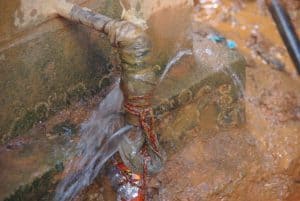 It is three months later at the moment of writing. Our contact person had to be in Tana and there he bought all the material needed for the work. And yes! In the weekend of 20/21 May we saw the plumber cycling down the road into the village. All the material was there and he started his work. To our surprise he started in the higher part of the village, located on a mountain and called Maroamboka-ambony (Maroamboka-up). We did not know that their pumps where failing as well. Systematically the plumber worked his way down. It is interesting to see how they work here. In Holland the plumbers just close the main pipe and they work with now water pressure on the pipes. A main valve is nowhere to be found here so they have to work with the water pressure on… nice and fresh in this climate!
It is three months later at the moment of writing. Our contact person had to be in Tana and there he bought all the material needed for the work. And yes! In the weekend of 20/21 May we saw the plumber cycling down the road into the village. All the material was there and he started his work. To our surprise he started in the higher part of the village, located on a mountain and called Maroamboka-ambony (Maroamboka-up). We did not know that their pumps where failing as well. Systematically the plumber worked his way down. It is interesting to see how they work here. In Holland the plumbers just close the main pipe and they work with now water pressure on the pipes. A main valve is nowhere to be found here so they have to work with the water pressure on… nice and fresh in this climate!
Meanwhile we are enjoying the water for a week already. It is nice and calm in the house as we do not have to wrestle with the jerrycans anymore. On top of that, we can use a little more water without worrying all the time. Enough water to wash, to shower and even to flush the toilet gives us more time to spend on other things. People in the village are happy as well. Everybody has a working pump near the house now. It is lovely to hear the happy noises, in the mornings and evenings; noises of people chatting while they wait their turn to was themselves or to wash their clothes. We are so happy that this problem could be solved! As said, it give us much more time to do other things. God is good!
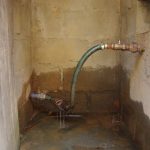
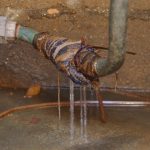
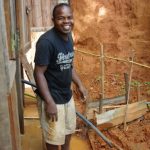
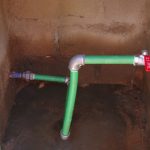
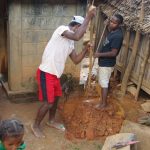
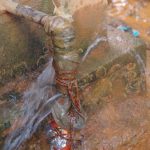
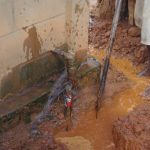
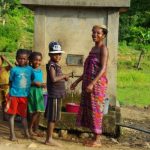
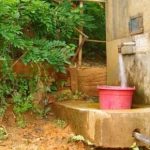
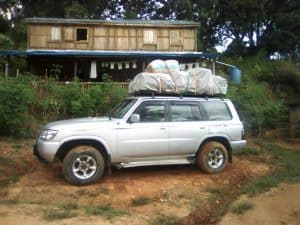 The roads are extremely bad and even though we have a sturdy 4×4 it is not always possible to come in or out of the area. After living in Maroamboka for a year we have to the conclusion that our car needs some modifications. These modifications will help us greatly to travel in and out the area more easily and, not unimportant, more safely.
The roads are extremely bad and even though we have a sturdy 4×4 it is not always possible to come in or out of the area. After living in Maroamboka for a year we have to the conclusion that our car needs some modifications. These modifications will help us greatly to travel in and out the area more easily and, not unimportant, more safely.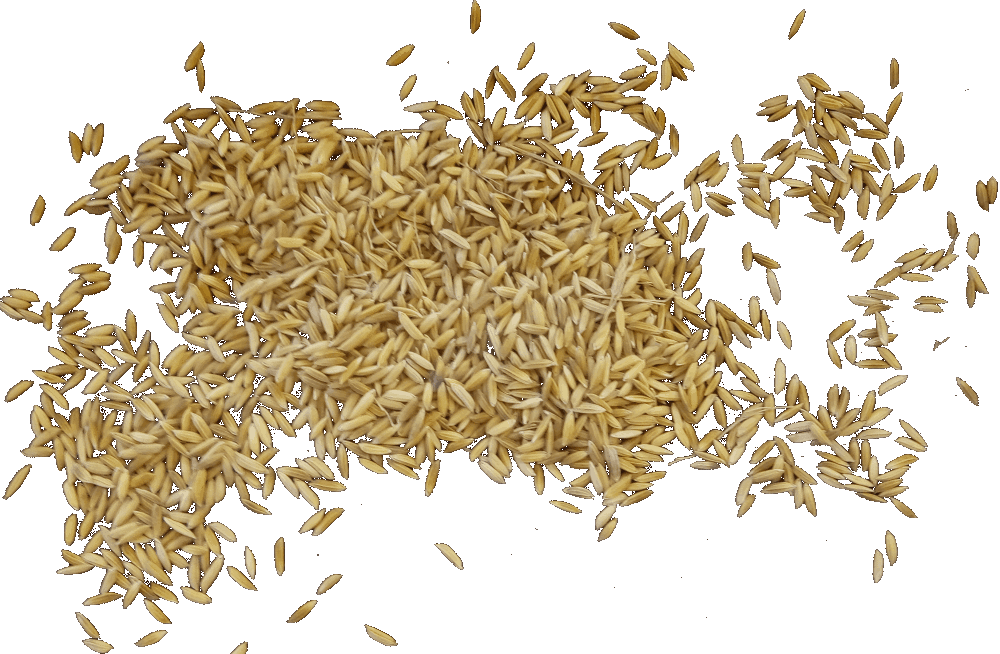

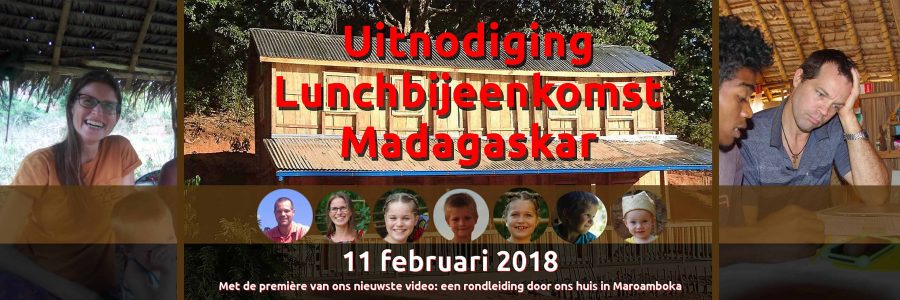


 It is three months later at the moment of writing. Our contact person had to be in Tana and there he bought all the material needed for the work. And yes! In the weekend of 20/21 May we saw the plumber cycling down the road into the village. All the material was there and he started his work. To our surprise he started in the higher part of the village, located on a mountain and called Maroamboka-ambony (Maroamboka-up). We did not know that their pumps where failing as well. Systematically the plumber worked his way down. It is interesting to see how they work here. In Holland the plumbers just close the main pipe and they work with now water pressure on the pipes. A main valve is nowhere to be found here so they have to work with the water pressure on… nice and fresh in this climate!
It is three months later at the moment of writing. Our contact person had to be in Tana and there he bought all the material needed for the work. And yes! In the weekend of 20/21 May we saw the plumber cycling down the road into the village. All the material was there and he started his work. To our surprise he started in the higher part of the village, located on a mountain and called Maroamboka-ambony (Maroamboka-up). We did not know that their pumps where failing as well. Systematically the plumber worked his way down. It is interesting to see how they work here. In Holland the plumbers just close the main pipe and they work with now water pressure on the pipes. A main valve is nowhere to be found here so they have to work with the water pressure on… nice and fresh in this climate!









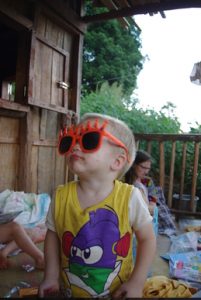 For some reason children always seem to detect odd things hidden away in cars. Somewhere between the boxes stood a big bag full of presents. Next day the atmosphere could best be described as that of a child waiting for the presents on Christmas or his/her birthday. How exciting to finally unwrap everything! Chocolate, felt pens, candy, letters, toys special Dutch orange sunglasses and t-shirts and so on and so forth. Where to begin? First chocolate or first playing with the newly gained toys? Maybe both at the same time! It was a big happening, what a feast.
For some reason children always seem to detect odd things hidden away in cars. Somewhere between the boxes stood a big bag full of presents. Next day the atmosphere could best be described as that of a child waiting for the presents on Christmas or his/her birthday. How exciting to finally unwrap everything! Chocolate, felt pens, candy, letters, toys special Dutch orange sunglasses and t-shirts and so on and so forth. Where to begin? First chocolate or first playing with the newly gained toys? Maybe both at the same time! It was a big happening, what a feast.
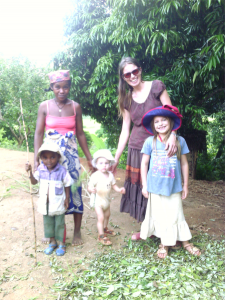 Friends and good neighbours help make a house a home, and that certainly goes for us here. We already knew Sylvestre, our first contact here who allowed AIM to build us a house on a plot of his land. We regularly share a meal. We have also become acquainted with the president of the fokontany, a high local government official, and his wife.
Friends and good neighbours help make a house a home, and that certainly goes for us here. We already knew Sylvestre, our first contact here who allowed AIM to build us a house on a plot of his land. We regularly share a meal. We have also become acquainted with the president of the fokontany, a high local government official, and his wife.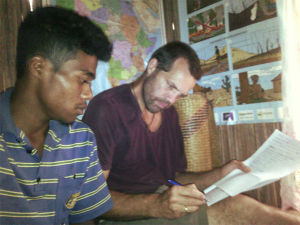 Then there is Menja, the local teacher, who has agreed to help Jurgen translate Bible stories into Tanala. They have already visited a remote village together.
Then there is Menja, the local teacher, who has agreed to help Jurgen translate Bible stories into Tanala. They have already visited a remote village together.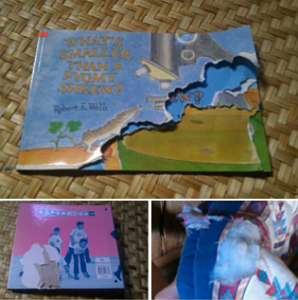 Then the rats. When we asked our friend maman’i Prisca whether she had rats in her house she said “Yes, in the roof.” Did that not bother her and keep her from sleep? “Oh well, we Malagasy sleep together with animals.” is what she replied. We honestly have a little trouble there. So far the rats have put their teeth in our food, soap, bedding, pillow covers, clothing, schoolbooks, toys, and wood. We are not amused. We gave Vanya a kitten, but she is still somewhat young to be on the job. In the meantime Jurgen is making us a ratproof cupboard for storing our fresh foods. No more rats on our tomatoes!
Then the rats. When we asked our friend maman’i Prisca whether she had rats in her house she said “Yes, in the roof.” Did that not bother her and keep her from sleep? “Oh well, we Malagasy sleep together with animals.” is what she replied. We honestly have a little trouble there. So far the rats have put their teeth in our food, soap, bedding, pillow covers, clothing, schoolbooks, toys, and wood. We are not amused. We gave Vanya a kitten, but she is still somewhat young to be on the job. In the meantime Jurgen is making us a ratproof cupboard for storing our fresh foods. No more rats on our tomatoes!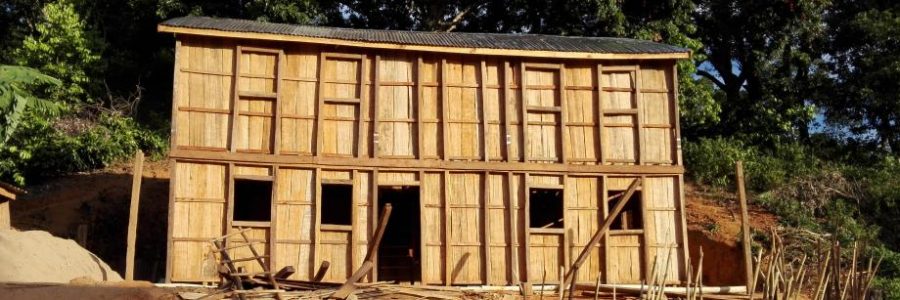
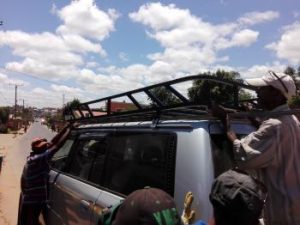 We wanted to visit the side earlier but putting all the car papers in our name took much longer than anticipated. Finally, we received all the papers… that is to say, the temporary papers. Hopefully he official papers will be ready at the end of December 2016. Jurgen’s Malagasy drivers licence is a whole different story. To get the official licence we need a visa that has to be still six months valid. This is not so straightforward as it might sound. When we apply for a visa (for the new year) we receive a paper that says that we have applied. With this paper we can travel but it is not the same as the official visa. Still, the validity of the visa starts as soon as we apply. In other words, if we receive the official visa after 4 months it will only be valid for eight more months. Our hope is that we will get our visa in time to transform the temporary licence to a permanent one.
We wanted to visit the side earlier but putting all the car papers in our name took much longer than anticipated. Finally, we received all the papers… that is to say, the temporary papers. Hopefully he official papers will be ready at the end of December 2016. Jurgen’s Malagasy drivers licence is a whole different story. To get the official licence we need a visa that has to be still six months valid. This is not so straightforward as it might sound. When we apply for a visa (for the new year) we receive a paper that says that we have applied. With this paper we can travel but it is not the same as the official visa. Still, the validity of the visa starts as soon as we apply. In other words, if we receive the official visa after 4 months it will only be valid for eight more months. Our hope is that we will get our visa in time to transform the temporary licence to a permanent one.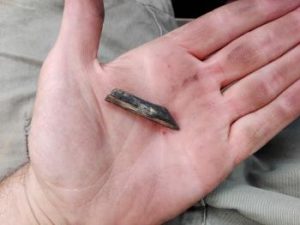 The national roads on Madagascar look very much like Dutch cheese with holes. This makes travelling very tiresome. At noon Issa and Jurgen arrived in a place call
The national roads on Madagascar look very much like Dutch cheese with holes. This makes travelling very tiresome. At noon Issa and Jurgen arrived in a place call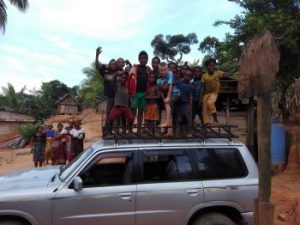 ed Abohimahasoa. There they stopped to spend the night in a hotel. The next day they travelled the second part. Near Ifanadiana one of the tires went flat, a piece of wood stuck right through. Fortunately help was not far. Jurgen stopped the car near one of the many police checkpoints and asked one of the officers for help. The officer first had to put his AK47 aside and then he stopped a lorry. He told the driver that the foreigners needed help. The lorry driver, together with a local, changed the wheel and said that there was no need for Jurgen to get his hands dirty. A few miles further the tire was repaired in Ifanadiana for about € 1,70.
ed Abohimahasoa. There they stopped to spend the night in a hotel. The next day they travelled the second part. Near Ifanadiana one of the tires went flat, a piece of wood stuck right through. Fortunately help was not far. Jurgen stopped the car near one of the many police checkpoints and asked one of the officers for help. The officer first had to put his AK47 aside and then he stopped a lorry. He told the driver that the foreigners needed help. The lorry driver, together with a local, changed the wheel and said that there was no need for Jurgen to get his hands dirty. A few miles further the tire was repaired in Ifanadiana for about € 1,70.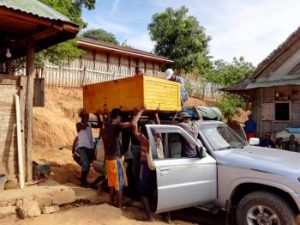
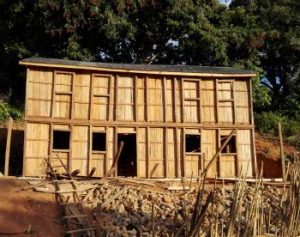
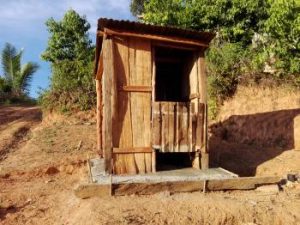 The house is situated next to a water-well with clean water. Most of the time there is enough pressure to install some plumbing. This is something the builder will look at. However, during Jurgen’s and Issa’s visit the well didn’t give much water due to a lack of rain. We will have to see whether we can solve this with a water reservoir that can collect and store rainwater. The house is mainly built of wood from the nearby rainforest. We will have, however, a tin roof and the ground floor is made of cement. The traditional houses have a leaf roof and a wooden or mud floor. This is a set up for trouble during the rainy season. Coming month we will look for a solar panel system. Solar panels are more common as many have a little system to recharge phones and the like.
The house is situated next to a water-well with clean water. Most of the time there is enough pressure to install some plumbing. This is something the builder will look at. However, during Jurgen’s and Issa’s visit the well didn’t give much water due to a lack of rain. We will have to see whether we can solve this with a water reservoir that can collect and store rainwater. The house is mainly built of wood from the nearby rainforest. We will have, however, a tin roof and the ground floor is made of cement. The traditional houses have a leaf roof and a wooden or mud floor. This is a set up for trouble during the rainy season. Coming month we will look for a solar panel system. Solar panels are more common as many have a little system to recharge phones and the like.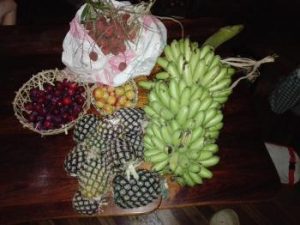 The came back with a lot of fruit given by the locals. We are planning another trip to Maroamboka soon. We will have to bring more furniture and other things like our bed and school material for the children. The builder estimated that we can move as a family somewhere in January 2017.
The came back with a lot of fruit given by the locals. We are planning another trip to Maroamboka soon. We will have to bring more furniture and other things like our bed and school material for the children. The builder estimated that we can move as a family somewhere in January 2017.
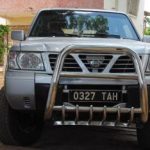 This is it: our Nissan Patrol, built 1999. We had to search a long time for this mechanical vehicle, but now we have succeeded. It is important that the car is not only a four-wheel-drive, but also that it is mechanical rather than electrical. Mechanical cars are easier to repair; if necessary even by non-mechanics. Some simple tools and a phone in hand will come a long way. For the car-lovers among you: the engine is a 4.2 litre diesel, 6 cylinders. Click on the photo to see more pictures.
This is it: our Nissan Patrol, built 1999. We had to search a long time for this mechanical vehicle, but now we have succeeded. It is important that the car is not only a four-wheel-drive, but also that it is mechanical rather than electrical. Mechanical cars are easier to repair; if necessary even by non-mechanics. Some simple tools and a phone in hand will come a long way. For the car-lovers among you: the engine is a 4.2 litre diesel, 6 cylinders. Click on the photo to see more pictures.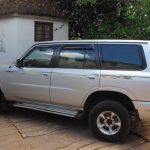
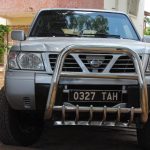
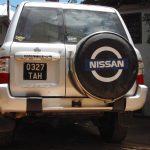
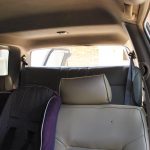
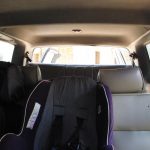
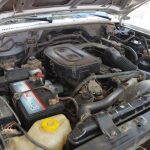
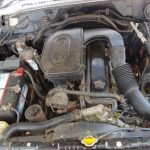
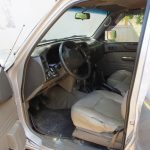
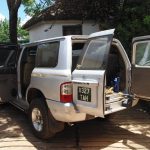
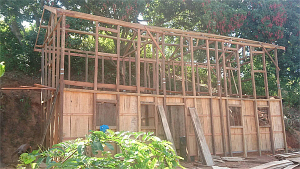 The builders al ready started to build our house. A couple of weeks ago we heard that the house was al ready finished for 50%. Initially we thought that they meant to say that the builder collected 50% of all the material, but no! He send us some pictures, which amazed us. We have good hopes that the house will be finished at the end of this month. However, the builder told us that the rain does make things harder. Still, we expect that we can move, as a family, at the beginning of the new year.
The builders al ready started to build our house. A couple of weeks ago we heard that the house was al ready finished for 50%. Initially we thought that they meant to say that the builder collected 50% of all the material, but no! He send us some pictures, which amazed us. We have good hopes that the house will be finished at the end of this month. However, the builder told us that the rain does make things harder. Still, we expect that we can move, as a family, at the beginning of the new year.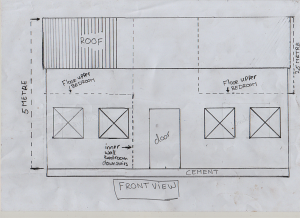 We have provided the drawings for the house ourselves. The builder adjusted a few things… and, as you can see, during the construction things have been changed a bit more. The ground surface will be around the 40m2. On each side of the house we will have a second floor with two bedrooms: One for the girls and one for the boys. The master bedroom will be on the ground floor with at the other side a living room with kitchen. Outside the house we will get a toilet and a washroom. Attached to the house we will get a porch where we can sit and dry our clothes. The builders use local material: the house will be made of wood with a concrete floor and a tin roof.
We have provided the drawings for the house ourselves. The builder adjusted a few things… and, as you can see, during the construction things have been changed a bit more. The ground surface will be around the 40m2. On each side of the house we will have a second floor with two bedrooms: One for the girls and one for the boys. The master bedroom will be on the ground floor with at the other side a living room with kitchen. Outside the house we will get a toilet and a washroom. Attached to the house we will get a porch where we can sit and dry our clothes. The builders use local material: the house will be made of wood with a concrete floor and a tin roof.